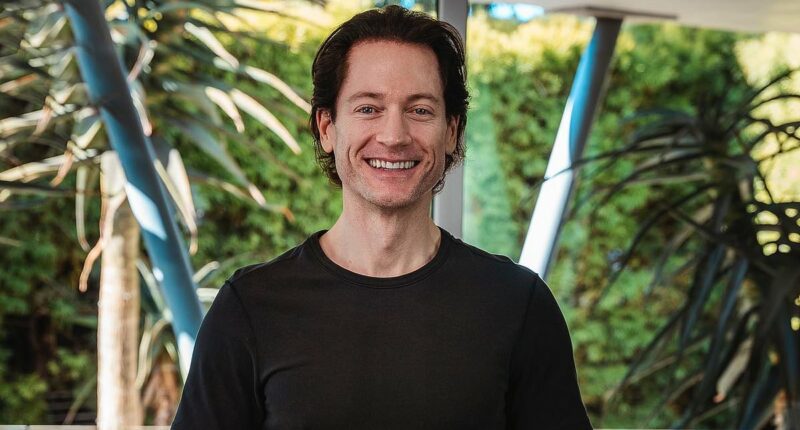Share this @internewscast.com
The pursuit of longevity has captured the collective imagination as more individuals explore methods to extend their lives and bolster their health down the line.
However, the broader national landscape reveals some concerning trends. As of 2023, 76% of American adults, equivalent to approximately 194 million people, reported living with at least one chronic health issue.
This figure marks an increase from 72%, or roughly 177 million individuals, recorded in 2013.
The prevalence of adults suffering from multiple chronic conditions has also risen, climbing from 47% in 2013 to 51% in 2023.
Despite these health challenges, life expectancy has shown little change. From 2019 to 2024, the average lifespan in the U.S. remained steady around 79 years.
When compared to other affluent nations such as Australia, Canada, and the UK, the United States lags behind, showcasing the lowest life expectancy among these peers.
Experts say rising drug overdose deaths, climbing obesity rates, and widespread chronic disease are major forces pushing longevity in the wrong direction.
At the same time the booming longevity industry, spearheaded by high-profile biohackers such as Bryan Johnson, often promises dramatic results through expensive supplements, extreme routines, or invasive procedures.

While life expectancy is decreasing, the longevity industry is booming, with high-profile biohackers such as Bryan Johnson (pictured) striving to find the key to a longer life
But these pricey age-boosting options are out of reach for most Americans.
However, research shows that meaningful improvements don’t require costly interventions. Numerous scientific studies point to simple, realistic lifestyle changes that can extend lifespan and support healthier aging.
Below, Daily Mail outlines six science-backed strategies that may help slow, and even partly reverse, biological aging.
Speaking multiple languages
A large-scale European study has found that speaking more than one language may help slow both cognitive and biological aging.
Researchers from institutions in Spain and Argentina analyzed data from over 86,000 adults across 27 European countries and used artificial intelligence to assess each participant’s ‘biobehavioral age gap’: the difference between their predicted biological age and actual chronological age.
The results revealed that multilingual individuals were more than twice as likely as monolinguals to show signs of healthy aging, suggesting that learning and speaking multiple languages could provide a protective effect against age-related decline.
The study’s authors believe that the mental stimulation involved in managing multiple languages strengthens cognitive function and may contribute to longer-lasting overall brain health.
While the findings highlight a potential link between multilingualism and healthier aging, researchers note that further studies are needed to fully understand the mechanisms at play.
The research adds to a growing body of evidence suggesting that keeping the brain engaged, whether through language, learning, or other mentally stimulating activities such as board games, may help maintain cognitive vitality well into later life.
Consistently exercising

Recent research confirms what health experts have long suspected: staying physically active not only boosts overall health but can also slow the biological aging process.
A 2023 study by the University of São Paulo in Brazil found that previously sedentary middle-aged women who followed an eight-week exercise program experienced a measurable reduction in their biological age.
The program consisted of 60-minute workouts three times per week, combining aerobic and strength training, and participants showed an average two-year reduction in epigenetic age, a measure of aging based on DNA markers.
Exercise is believed to influence DNA methylation, a natural process that controls whether certain genes are ‘on’ or ‘off.’
As we age, some of these genes start switching off, contributing to wrinkles, gray hair, and other signs of aging.
Regular physical activity helps keep these genes active, allowing the body to maintain essential functions for longer.
Experts note that it’s never too late to start. Even short sessions of strength and endurance exercises three to four times a week for as little as 23 minutes have been shown to significantly slow aspects of aging.
Beyond biological age, being more active is linked to a lower risk of death from all causes, making exercise a powerful tool for longevity as well as overall wellness.
Avoiding processed foods
Making healthier food choices may do more than improve overall wellness, it could actually slow the aging process.
A 2022 study by researchers at the NIH involving nearly 2,700 women found that adopting a nutrient-rich, balanced diet for 6 to 12 months was associated with a reduction in biological age by an average of 2.4 years.
The research, conducted by a team of nutrition and aging specialists, showed that the benefits were particularly pronounced in participants with chronic diseases or obesity, suggesting that dietary changes can have an even greater impact for those at higher health risk.
Healthier eating patterns emphasized fruits, vegetables, whole grains, nuts, legumes, fish, lean proteins, and healthy fats, while limiting red meat, added sugars, saturated fats, and sodium.
Such diets provide antioxidants, vitamins, and anti-inflammatory compounds that help repair cellular damage, reduce stress on DNA, and influence DNA methylation.
According to the study authors, these findings highlight that long-term dietary changes can meaningfully support healthy aging, reinforcing the link between nutrition and longevity.

Making healthier food choices may do more than improve overall wellness, it could actually slow the aging process (stock image)
Getting quality sleep
Quality sleep may be one of the most important factors in healthy aging, researchers say, affecting nearly every system in the body.
Sleep allows the body to repair DNA, restore hormonal balance, reduce inflammation, and clear cellular waste, processes that help the immune, metabolic, and nervous systems stay strong and resilient.
A 2022 study published in PLOS Medicine has found a strong link between short sleep and accelerated biological aging.
Researchers from University College London and Université Paris Cité analyzed data from over 10,000 people employed in the London offices of the British civil service, focusing on their sleeping patterns.
The findings revealed that after age 50, individuals sleeping fewer than five hours per night had a 30 percent higher risk of developing multiple chronic conditions, rising to 40 percent by age 70. These conditions included diabetes, heart disease, cancer, dementia, stroke, and chronic kidney disease.
Meanwhile, a large-scale UK study of nearly 200,000 participants found that shift workers, particularly those on night shifts, showed biological markers indicating they were roughly one year ‘older’ than colleagues working standard daytime hours.
Researchers from Sun Yat-sen University in China, who conducted the study, suggest that disrupted circadian rhythms, hormonal imbalances, and chronic stress from irregular sleep schedules may accelerate cellular aging.
Experts say prioritizing regular, restorative sleep, typically seven to nine hours per night for most adults, could be one of the most effective ways to protect long-term health and slow the aging process.

A 2022 study published in PLOS Medicine has found a strong link between short sleep and accelerated biological aging (stock image)
Cutting back on unhealthy habits
Evidence shows that alcohol, smoking, and vaping are among the most significant drivers of premature aging.
Smoking, for instance, is shown to rapidly age the lungs.
A 2019 study published in the Clinical Epigenetics journal found that smoking increased the epigenetic age of lung tissue by an average of 4.3 years and airway cells by an average of 4.9 years.
Meanwhile a 2022 genetic study from University of Oxford provided compelling evidence that alcohol consumption can also accelerate biological aging.
Using data from over 245,000 individuals from the UK Biobank, the researchers found that higher alcohol intake, both in volume and through alcohol use disorder, was associated with shortened telomeres, which are markers of cellular aging.
The study’s findings suggest that drinking more than 17 units of alcohol per week is linked to accelerated biological aging, with a consumption of 32 units per week associated with an equivalent of about three extra years of biological aging.

A 2019 study published in the Clinical Epigenetics journal found that smoking increased the epigenetic age of lung tissue by an average of 4.3 years (stock image)
Quieting your mind
Managing stress is crucial for healthy aging. A 2021 Yale University study found that psychological resilience factors like emotion regulation and self control can moderate the relationship between cumulative stress and biological age acceleration.
The study showed that while cumulative stress is linked to faster aging, the ability to manage stress and emotions can slow down this effect.
Rajita Sinha, the Foundations Fund Professor of Psychiatry at Yale who worked on the study, said that prolonged stress increases the risk of heart disease, addiction, mood disorders, and post-traumatic stress disorder.
It can also influence metabolism, accelerating obesity-related disorders such as diabetes. Stress also saps our ability to regulate emotions and to think clearly.
One 2022 study even found that working over 40 hours a week was linked to a two-year increase in biological age, likely due to chronic stress.
Stress speeds up aging by disrupting hormones, damaging DNA, and weakening the immune system. It can also indirectly worsen other aging factors, like poor sleep, unhealthy eating, and habits such as smoking or drinking. This highlights the importance of developing healthy coping strategies.
Research is also revealing that loneliness, extreme temperatures, air pollution, and living in disadvantaged areas can influence aging. The impact of these factors varies depending on genetics, lifestyle habits, and duration of exposure.












